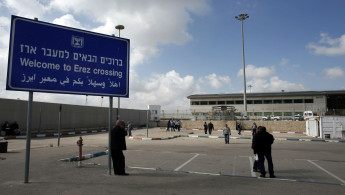Israel quietly lets in Gaza workers under ceasefire deal
Israel effectively revoked thousands of work permits when it joined Egypt in imposing a crippling blockade on Gaza after Hamas seized power from rival Fatah forces.
The blockade, along with three wars between Hamas and Israel, has devastated the economy in Gaza, where unemployment is over 50 percent.
In recent months, Israel has quietly provided some relief as part of an unofficial, Egyptian-brokered truce with Hamas, in exchange for reduced rocket fire from the territory and the scaling back of weekly protests along the border.
It has allowed Qatar to deliver millions of dollars in cash to allow Hamas to pay its civil servants and has allowed the United Nations to step up aid efforts.
Now it appears Israel has expanded a programme in which it had long provided hundreds of permits to business owners to travel to Israel and the West Bank for commerce.
Palestinian officials say it is now providing some 5,000 so-called merchant permits and awarding them to Palestinians working as laborers in construction, agriculture and manufacturing.
Twitter Post
|
The Israeli military body that administers civilian affairs in Gaza did not respond to requests for comment. Hamas officials also declined to comment.
Some workers said they had paid up to $500 to a Gaza company to apply for a merchant permit and then reconnected with firms they had previously worked for before 2007.
Salih al-Ziq, the head of the Palestinian Authority's liaison committee, which coordinates the entry and exit of Palestinians with Israel, said Israel increased its quota for trader permits from less than 1,000 in 2017 to 5,000 today.
He said 4,000 have already been issued and that the committee stopped receiving new applications after 2,000 were submitted for the last 1,000 slots.
Another Palestinian official, who was not authorised to talk to the media and so spoke on condition of anonymity, said the Palestinian Authority was not involved in the decision to expand the permits, calling it a deal reached by Israel and Hamas.
The Western-backed PA, based in the occupied West Bank, has accused Israel of providing a lifeline to its Hamas rivals by easing the blockade as part of the informal cease-fire.
In a bizarre role reversal, Israel has been providing aid to Hamas while the Palestinian Authority has tried to isolate it.
The liaison committee plans to take measures to rein in the awarding of trader permits. This month it transferred the vetting authority to the Gaza Chamber of Commerce, apparently to avoid taking any part in the understandings between Israel and Hamas.
The increased quota still represents a "small fraction" of the 26,000 Palestinians who crossed into Israel from Gaza for work prior to the outbreak of the second Palestinian intifada in 2000, according to Gisha, an Israeli rights group advocating freedom of movement.
Maher al-Tabaa, an official with the Gaza Chamber of Commerce, said a "large portion" of those exiting on trader permits are workers. He said Israel has extended the permits from three to six months and lowered the minimum age of eligibility to 25 from 30.
"This is good for Gaza, but it's a very limited effect," he said. "We need 15,000 to 20,000 workers to go there in order to feel the effect of this easing."
Agencies contributed to this report.
Follow us on Twitter: @The_NewArab





 Follow the Middle East's top stories in English at The New Arab on Google News
Follow the Middle East's top stories in English at The New Arab on Google News


